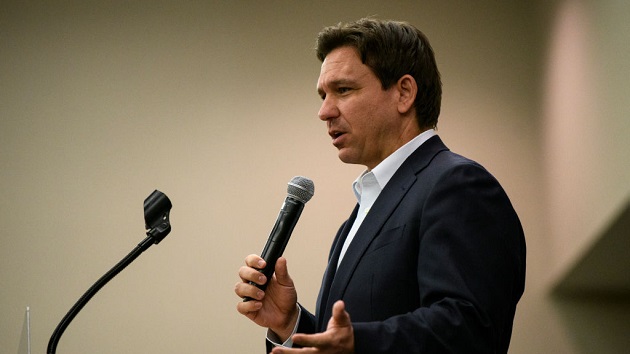
(TALLAHASSEE, Fla.) — Florida Gov. Ron DeSantis signed a slate of legislation Wednesday targeting the LGBTQ community, including restrictions on transgender health care, content on LGBTQ identities in schools, transgender bathroom use and drag performances in the state.
The news comes on the International Day against Homophobia, Transphobia, and Biphobia, May 17.
What the new laws say
Florida state bill DB 254 will restrict gender-affirming healthcare for transgender people under the age of 18, allowing the state to take temporary custody over any child who receives such treatment.
“Sex-reassignment prescriptions and procedures are prohibited for patients younger than 18 years of age,” the legislation reads.
Gender-affirming care has been found to be associated with improved mental health of transgender adolescents and teenagers, according to research in the New England Journal of Medicine and JAMA Pediatrics.
House Bill 1069 will expand the Parental Rights in Education law, dubbed the “Don’t Say Gay” law by critics. The new measure will restrict classroom instruction on gender identity or sexual orientation from prekindergarten through grade 8. From grades 9 through 12, such content must be “age-appropriate or developmentally appropriate for students in accordance with state standards.” However, the Florida Board of Education had already voted to expand the restriction from kindergarten through 12th grade.
House Bill 1521 will require transgender people to use the bathrooms that correspond with their gender assigned at birth.
A 2018 study from the Williams Institute at UCLA School of Law found no evidence that laws requiring transgender people to use the bathroom of their gender at birth lead to decreases in safety or privacy violations.
Senate Bill 1438 prohibits minors from attending any “adult live performances,” which may impact drag performances.
The legislation defines “adult live performance” as “any show, exhibition, or other presentation in front of a live audience which … depicts or simulates nudity, sexual conduct, sexual excitement, or specific sexual activities … lewd conduct, or the lewd exposure of prosthetic or imitation genitals or breasts,” as well as other stipulations concerning the interest, conduct and value of the performance.
The debate over LGBTQ rights
Advocates and allies criticized the legislation, arguing that the bills will harm the LGBTQ community which already faces higher rates of discrimination and violence.
Nadine Smith, of Equality Florida, said the legislation uses vague language “to inflict maximum harm.”
“They use the vagueness as a shield so they can, in court, feign innocent and political accountability for the harm — the very real harm that they’re inflicting,” Smith said in a press conference following the legislation. “The harm DeSantis is inflicting on Florida is real and it will outlast his time in office. Florida has become synonymous with book bans, whitewashing history, anti-LGBTQ attacks, radicalized right wing groups often armed, menacing our families.”
DeSantis applauded the legislation, saying that the new restrictions allow “kids to be kids.”
“I feel very strongly as governor but also just as a dad of a six, a five, and a three year old that we need to let our kids just be kids and we have a very crazy age that we live in — there’s a lot of nonsense that gets floated around. And what we’ve said in Florida is, we are going to remain a refuge of sanity and a citadel of normalcy,” DeSantis said.
This new slate of bills is the latest move in DeSantis’ self-proclaimed war against “woke” beliefs, restricting education and content on marginalized identities.
‘Woke’ is defined by the DeSantis administration as “the belief there are systemic injustices in American society and the need to address them,” according to DeSantis’ general counsel, as reported by The Washington Post.
Copyright © 2023, ABC Audio. All rights reserved.
